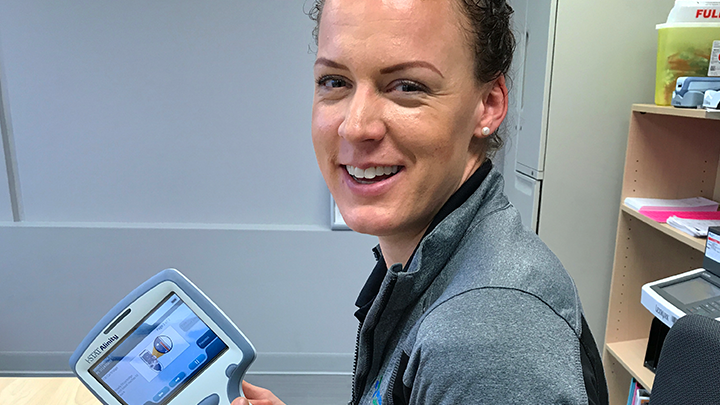
January 7, 2020

Amy Benson, team lead for North Zone Mobile Integrated Healthcare, shows off one of their new iStat Alinity point-of-care testing devices. Rolled out this fall, the devices act as a handheld lab for on-the-spot bloodwork testing for patients.
Story & photo by Diana Rinne
Peace River were among the first to receive these devices, outside of major centres, during the provincial rollout in October.
“We’re really excited about it,” says Amy Benson, MIH Team Lead for the North Zone. “It gives our staff and the physicians they work with better and more efficient clinical decision-making for our patients.”
The iStat Alinity point-of-care testing device is essentially a hand-held lab that allows the community paramedics to run bloodwork and get results quickly.
“We draw less than three millilitres of blood to successfully run that test. It runs — and within two minutes — we will get results,” adds Benson. “So if the physician orders bloodwork we can run it right there on scene and give the physicians immediate answers. It really equips us with better clinical decision-making right there.”
The testing device gives community paramedics the ability to perform a variety of tests, including for blood counts and electrolytes.
Working within an 80-km radius of Grande Prairie and Peace River, the MIH teams work closely with local homecare teams to care for many rural clients.
“In this area, we really try to speak to that homebound client who, for whatever reason, can’t get to the physician in an easy manner — and who often ends up accessing an ambulance to get to the hospital,” says Benson. “We know that this area has a lot of seniors who still live on their homesteads, and that’s really challenging for them. Those patients are the easy wins with this technology.”
Benson notes a situation in Calgary where the point-of-care testing detected a critical potassium level in a patient, resulting in a decision to transport that patient to hospital immediately.
“Having all of the information quickly really makes that decision easy for the physician and the practitioner that’s there on scene with the patient.”
The new equipment will also come into play as North Zone MIH teams continue building pathways with Addiction and Mental Health and other community organizations to serve those living with addiction and mental-health issues and who, for many reasons, may not be accessing healthcare consistently.
“I think there’s an opportunity there to meet these clients where they are at and to get results in a really timely manner and treat those patients accordingly with a physician order,” says Benson.
“To that population, timeliness is a really big factor. When they ask for help, they need it in a manner that’s responsive. When we are able to speak to that we win their trust and win further opportunities to be able to meet up with them and treat them — and for them to access care in a greater way.”
To date, the point-of-care testing equipment has been rolled out to community paramedic teams across the province, with the exception of those in AHS Edmonton Zone, which are due to receive it later this year.